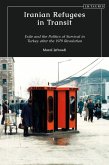Baba, as Farideh called her father, was a well-respected son of the chief rabbi and dayan of the Jews of Shiraz. During his last visit to the United States in 2006, he handed Farideh his memoir that chronicled the years of his life after exile: the confiscation of his passport while he attempted to return to Iran for his belongings, the resulting years of loneliness as he struggled against a hostile bureaucracy to return to his wife and family in Israel, and the eventual loss of the poultry farm that had supported his family. Farideh translated her father's memoir along with other documents she found in a briefcase after his death. Leaving Iran knits together her father's story of dislocation and loss with her own experience as an Iranian Jew in a newly adopted home. As an intimate portrait of displacement and the construction of identity, as a story of family loyalty and cultural memory, Leaving Iran is an important addition to a growing body of Iranian-American narratives.
Dieser Download kann aus rechtlichen Gründen nur mit Rechnungsadresse in A, B, BG, CY, CZ, D, DK, EW, E, FIN, F, GR, HR, H, IRL, I, LT, L, LR, M, NL, PL, P, R, S, SLO, SK ausgeliefert werden.









